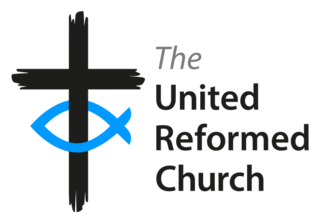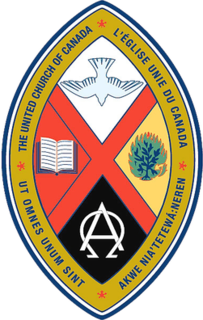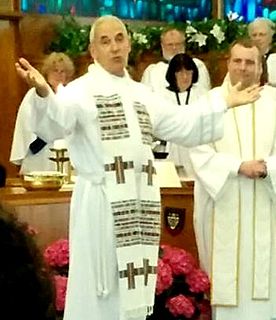Related Research Articles
Presbyterianpolity is a method of church governance typified by the rule of assemblies of presbyters, or elders. Each local church is governed by a body of elected elders usually called the session or consistory, though other terms, such as church board, may apply. Groups of local churches are governed by a higher assembly of elders known as the presbytery or classis; presbyteries can be grouped into a synod, and presbyteries and synods nationwide often join together in a general assembly. Responsibility for conduct of church services is reserved to an ordained minister or pastor known as a teaching elder, or a minister of the word and sacrament.

The United Reformed Church (URC) is a Protestant Christian church in the United Kingdom. It has approximately 46,500 members in 1,383 congregations with 608 active ministers, including 13 church related community workers.

The United Church of Canada is a mainline Protestant denomination that is the largest Protestant Christian denomination in Canada and the second largest Canadian Christian denomination after the Catholic Church in Canada.

The Uniting Church in Australia (UCA) was founded on 22 June 1977, when most congregations of the Methodist Church of Australasia, about two-thirds of the Presbyterian Church of Australia and almost all the churches of the Congregational Union of Australia united under the Basis of Union. According to the church, it had 243,000 members in 2018. In the 2016 census, about 870,200 Australians identified with the church; in the 2011 census, the figure was 1,065,796. The UCA is Australia's third-largest Christian denomination, behind the Catholic and the Anglican Churches. There are around 2,000 UCA congregations, and 2001 National Church Life Survey (NCLS) research indicated that average weekly attendance was about 10 per cent of census figures.

The Christian Reformed Church in North America is a Protestant Christian denomination in the United States and Canada. Having roots in the Dutch Reformed Church of the Netherlands, the Christian Reformed Church was founded by Dutch immigrants in 1857 and is theologically Calvinist.

The Metropolitan Community Church (MCC), also known as the Universal Fellowship of Metropolitan Community Churches (UFMCC), is an international Protestant Christian denomination. There are 222 member congregations in 37 countries, and the Fellowship has a specific outreach to lesbian, gay, bisexual, and transgender families and communities.
The Orthodox Presbyterian Church (OPC) is a confessional Presbyterian denomination located primarily in the northern United States. It was founded by conservative members of the Presbyterian Church in the United States of America (PCUSA) who strongly objected to the Modernist theology during the 1930s. It has had an influence on evangelicalism far beyond its size.

The Free Church of Scotland was a Scottish denomination which was formed in 1843 by a large withdrawal from the established Church of Scotland in a schism or division known as the Disruption of 1843. In 1900 the vast majority of the Free Church of Scotland joined with the United Presbyterian Church of Scotland to form the United Free Church of Scotland. The House of Lords judged that the minority continuing after the 1900 union were entitled to all the assets. While the denomination clearly had a starting date, in their own eyes their leaders had a legitimate claim to an unbroken succession of leaders going all the way back to the Apostles.

George Campbell Pidgeon was a Christian minister, first in the Presbyterian Church in Canada and then in the United Church of Canada, as well as the last Moderator of the Presbyterian Church before amalgamation and the first Moderator of the newly formed United Church of Canada. He was a strong proponent of the proposed union of churches and later in life championed ecumenism.

The Presbyterian Church in Canada is a Presbyterian denomination, serving in Canada under this name since 1875. The United Church of Canada claimed the right to the name from 1925 to 1939. According to the Canada 2001 Census 409,830 Canadians identify themselves as Presbyterian, that is, 1.4% of the population.

The Presbyterian Church in the United States of America (PCUSA) was the first national Presbyterian denomination in the United States, existing from 1789 to 1958. In that year, the PCUSA merged with the United Presbyterian Church of North America, a denomination with roots in the Seceder and Covenanter traditions of Presbyterianism. The new church was named the United Presbyterian Church in the United States of America. It was a predecessor to the contemporary Presbyterian Church (USA).

Victor Premasagar was the fourth successor of Frank Whittaker as Bishop in Medak. He was an Indian churchman and Old Testament scholar with major contribution to the Old Testament and to the field of Theology. Premasagar's articles have appeared in the Expository Times (1966), the Vetus Testamentum (1966), the International Review of Mission (1972), the Indian Journal of Theology (1974), and cited in major works relating to the theme of Promise in the Bible and critical works on Psalms LXXX and the Hebrew word HOQ in the Tanakh.
The clergy of the United Church of Canada are called "ministers". There are two "streams", ordered ministry and lay ministry. Ordered ministry includes ordained ministers and diaconal ministers. Lay ministry refers to licensed lay worship leaders (LLWL), designated lay ministers (DLM), sacraments elders, and congregational designated ministers (CDM). There are no restrictions on gender, sexual orientation, age, or marital status for any branches of ministry.
The Presbyterian Church in the Republic of Korea or the KiJang Presbyterian Church is an ecumenically-minded Presbyterian denomination in South Korea.

Gary J. Paterson was the Moderator of the United Church of Canada from 2012–2015. He was the first openly gay person to take the post since the church was formed in 1925 and the first in the world to lead a major Christian denomination.
The United Church of Canada uses a three-level model of governance, consisting of communities of faith; regional councils; and the General Council.
The Presbyterian Church of the Philippines (PCP), officially The General Assembly of the Presbyterian Church of the Philippines, is a growing evangelical, Bible-based Reformed church in the Philippines. It was officially founded in 1987 and the General Assembly was organized in September 1996.
Jordan Cantwell was the Moderator of the United Church of Canada from 2015 to 2018. She was ordained as a minister of the United Church in 2010, and was elected to the position of Moderator at the 42nd General Council of the church in Corner Brook, Newfoundland and Labrador in 2015.
The Centre for Christian Studies is a Canadian ecumenical theological school in Winnipeg, Manitoba, and is affiliated with the Anglican and United churches of Canada. It is a training centre for those becoming deacons and diaconal ministers; it provides continuing education for ministers and offers a variety of programs and workshops for others seeking to deepen their faith or explore theology. The centre's primary areas of study include pastoral care, social justice, collaborative learning, transformative education, and social ministry.
Elizabeth Rice Achtemeier was an American ordained Presbyterian minister, Bible professor, and author.
References
- 1 2 3 4 "The Very Rev. Dr. Marion Pardy, 37th Moderator". United Church of Canada. 2011-02-09. Archived from the original on 2015-08-11. Retrieved 2015-08-24.
- ↑ Hill Lindley, Susan; Stebner, Eleanor J. (2008). The Westminster Handbook to Women in American Religious History. Louisville, Kentucky: Westminster John Knox Press. p. 167.
- 1 2 "Marion Pardy – a person of Eleos". Centre for Christian Studies. 2013-08-21. Retrieved 2015-08-24.
| Religious titles | ||
|---|---|---|
| Preceded by Bill Phipps | Moderator of the United Church of Canada 2000–2003 | Succeeded by Peter Short |